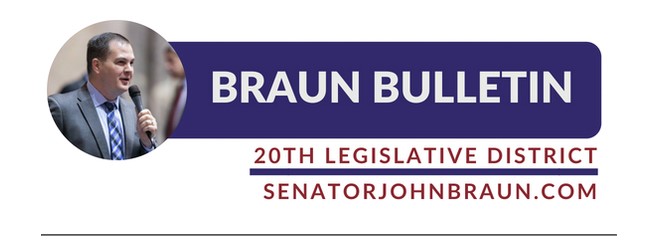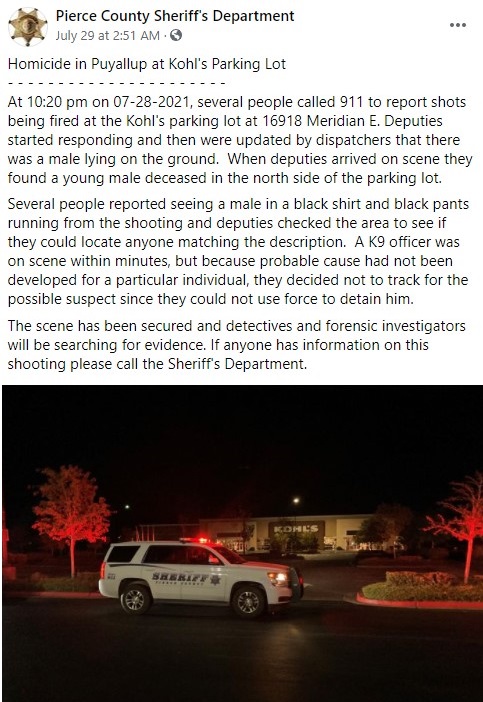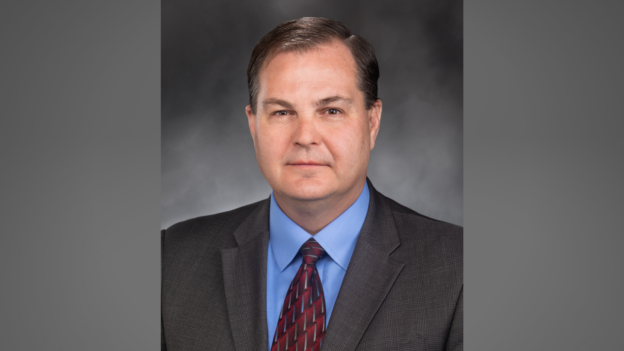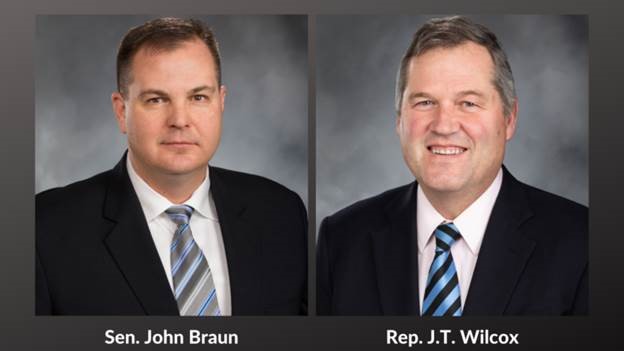 In the middle of a visit to the Southwest Washington Fair this past week I stepped away for a short interview on the Lars Larson radio show. He wanted to talk about the new COVID vaccine mandates from the governors of both Washington and Oregon (his show broadcasts from Portland).
In the middle of a visit to the Southwest Washington Fair this past week I stepped away for a short interview on the Lars Larson radio show. He wanted to talk about the new COVID vaccine mandates from the governors of both Washington and Oregon (his show broadcasts from Portland).
Lars asked me if I think Governor Inslee has the authority to require vaccinations. I replied that Inslee doesn’t care whether he has the authority or not. He doesn’t believe anyone will get in his way.
We can’t look to the members of the state Supreme Court for an intervention – not when the chief justice has also ordered the court’s employees to be fully vaccinated “as a condition of continued employment.” Inslee also knows his fellow Democrats who control the legislative branch may grumble privately but won’t oppose him publicly.
Unfortunately, Inslee isn’t the only state official displaying the government-knows-best attitude.
The superintendent of public instruction decided Inslee’s vaccine mandate for state employees and anyone doing business with the state should also apply to all K-12 school employees, so that’s been ordered also (it also affects employees of public charter schools, and private schools). The commissioner of public lands issued the same order this week for her agency’s employees, including those fighting wildfires around our state.
The elitist actions aren’t limited to COVID. Many people are wondering why their auto-insurance rates have mysteriously risen – it’s because the state insurance commissioner issued an order banning what’s called “credit scoring.”
There’s also the new payroll tax that is coming because the Legislature’s majority Democrats decided every Washington worker needs to buy long-term care insurance, one way or the other, whether they want to or not (there’s more on that below).
As I told Lars Larson, these people who are supposed to be public servants have apparently decided the public is incapable of successfully opposing their policies, and they’re willing to take advantage of that. Fortunately, I know the people have the final say, and I trust them. (Click here to listen to the interview.)
Vaccine mandate: ‘Dictating is not the same as leading’
Just before Thanksgiving 2020, after Governor Inslee announced a return to tighter restrictions on the economy, a city council member in the Tri-Cities said Inslee had lost his “moral authority.”
I’ve had the same thought – back then and many times since. People have seen the governor move the goalposts too many times during this pandemic, and they’re tired of hearing him attempt to justify his decisions by claiming he’s “following the science.” Six months ago I devoted an edition of my Economic Sense policy paper to how the governor’s pandemic-related policies had lost credibility.
The governor’s new vaccine mandate to state employees and so many others (including private health-care workers), announced this month, sends a clear message: He has no interest in understanding why about 30% of the people in our state are hesitant to get the COVID vaccine, and trying to address their concerns. He doesn’t trust them to decide, on their own, to take the safety precautions that were familiar to all of us before the vaccine came along. Instead, he’s going to threaten their paychecks.
This continued control of people’s lives is another reason legislators need to update the state law that gives the governor so much power during a state of emergency. This year Republicans proposed several bills to do that, including SB 5039, but the majority Democrats ignored it completely. They also won’t join us and bring the Legislature into a special session so we can address some of these issues.
The House Republican leader, Rep. J.T. Wilcox, and I came out strongly against the vaccine mandate. As we put it in a public statement earlier this month, we’ve both gotten the vaccine but recognize doing so is a personal choice that “should not be mandated by any level of government.”
When the governor doubled down this past week, adding educators and school staff to the vaccine-mandate list, I pointed out how dictating is not the same as leading – and suggested Inslee instead try an outreach campaign that is collaborative, compassionate and inclusive. That would be more worthwhile than coercing and publicly shaming people who have sincerely held concerns.
Mask mandate is back, and the ‘snitch list’ is still around
In May, the governor basically forced employers to become “vaccine police” by requiring them to keep track of their workers’ vaccination status and be able to report it to the state Department of Labor and Industries. That order is still in effect.
Now he has clearly put employers in the position of being the “mask police” as well. Not only did the governor bring back the indoor mask mandate that he’d dropped June 30; this time vaccination status doesn’t matter, and the tone of this new order seems harsher and more employer-focused than the mask mandate that first came on in June 2020. This time the proclamation explicitly prohibits businesses from allowing customers (and employees) to be inside without a face covering.
Also, it probably won’t be long before there are news reports about employers getting in trouble with the state about indoor masking. That’s because the governor’s office told a Seattle TV station it will “actively seek information about those not in compliance” through what some call the “snitch list” – meaning a complaint form posted on the state’s coronavirus website.

Still too few answers about upcoming payroll tax
Two years ago the majority Democrats passed a controversial piece of legislation to create what’s formally known as the Long-Term Services and Supports Trust. On the surface, this program seems to have a noble purpose – to make sure people have at least some level of coverage should they need long-term care. But it’s really an expensive government mandate: as mentioned above, the majority Democrats intend to force Washington workers to buy long-term care insurance, one way or the other.
Workers who don’t buy a private LTC policy in the next couple of months and apply for an exemption from the state will find themselves stuck in the government-run program. Starting in January, they will pay a new payroll tax of 58 cents per every $100 earned, meaning someone receiving $50,000 a year would have to pay $290 annually. No worker can opt out of the tax after November 1 of this year. The maximum lifetime benefit available is $36,500. If you choose to retire to another state, the benefit doesn’t go with you.
To top it off, the program is being managed by the state Employment Security Department – the same agency that failed to protect billions in taxpayers dollars from foreign fraudsters a year ago. It isn’t allowing anyone to apply for an exemption until October 1.
The Washington Policy Center has done some good work raising the alarm about this new tax (click here and here). Our office has received many messages from people who want more information and have found the LTSS program website (called WA Cares) short on details. Recently, ESD has quietly opened a toll-free call center for questions about exemptions, at 833-717-2273. Also, questions may be emailed to wacarefund@dshs.wa.gov – just be aware that what ESD calls the “most current” information available is not necessarily final.
Law-enforcement ‘reforms’ have backfired and need to be fixed sooner than later

Late last month a young man was fatally shot in a shopping mall parking lot in Pierce County. Several people offered a description of someone who had run from the scene, and a K-9 officer arrived within minutes, the sheriff’s office reported in a social-media post.
Then, the post continued, “because probable cause had not been developed for a particular individual, they decided not to track for the possible suspect since they could not use force to detain him.”
That’s right. The search for a murder suspect basically ended before it began, due to the new law created by House Bill 1310, which took effect just three days before the killing. It tightly restricts the use of force by law enforcement and corrections officers. One of the new limits explicitly mentions the need for probable cause. (An arrest was made in the Puyallup case, but not until more than two weeks had passed.)
Another new law resulting from this year’s passage of House Bill 1054 prohibited certain police tactics and equipment. It forced Longview police responding to a recent standoff to break windows with rocks to allow the deployment of tear gas – because the Democrats’ ban of firearms of .50 caliber or larger also banned the launchers used to fire non-lethal “bean bags.”
That new policy also means nearly any vehicle pursuit must be authorized in advance by a supervisor. Several days after it took effect, a reckless driver successfully eluded a state trooper who had been advised he was “not legally allowed to pursue the fleeing vehicle.”
The lead sponsors of the House bills say they are meant, in part, to “transform how police show up in our communities.” Well, it’s worked, but not in a way that makes our communities safer.
These so-called “reforms” affect more than law-enforcement officers. First responders and hospital staff can no longer count on a law-enforcement presence to provide security on the scene or in an examination room when they’re dealing with violent or unstable persons in certain situations – the new law forbids the use of physical force unless there is an “imminent” threat of bodily injury.
As the cracks in these new rules become obvious to the public, the Democrats who rushed them into law have resorted to claiming there’s “a lot of misinformation flying around.” They also asked the state attorney general to write something that they hope will give “guidance” to law-enforcement agencies. You don’t ask for help like that unless you realize your new policies have serious problems.
All of this is happening as our state is seeing a jump in violent crime, according to a recently released crime data report for 2020, and as another law created by the majority side this year basically decriminalizes the possession of heroin, methamphetamine and other hard drugs.
Republican legislative leaders have called for a special legislative session to deal with the fallout from these so-called “reforms. The Washington Sheriffs’ Association recently made the same request to the governor. He has refused. The governor’s office instead says “more education” is needed, which sounds like more Democrat elitism: if new laws cause problems, it can’t possibly be the fault of the policymakers, so let’s point fingers at law-enforcement officers instead. That’s not good government.























